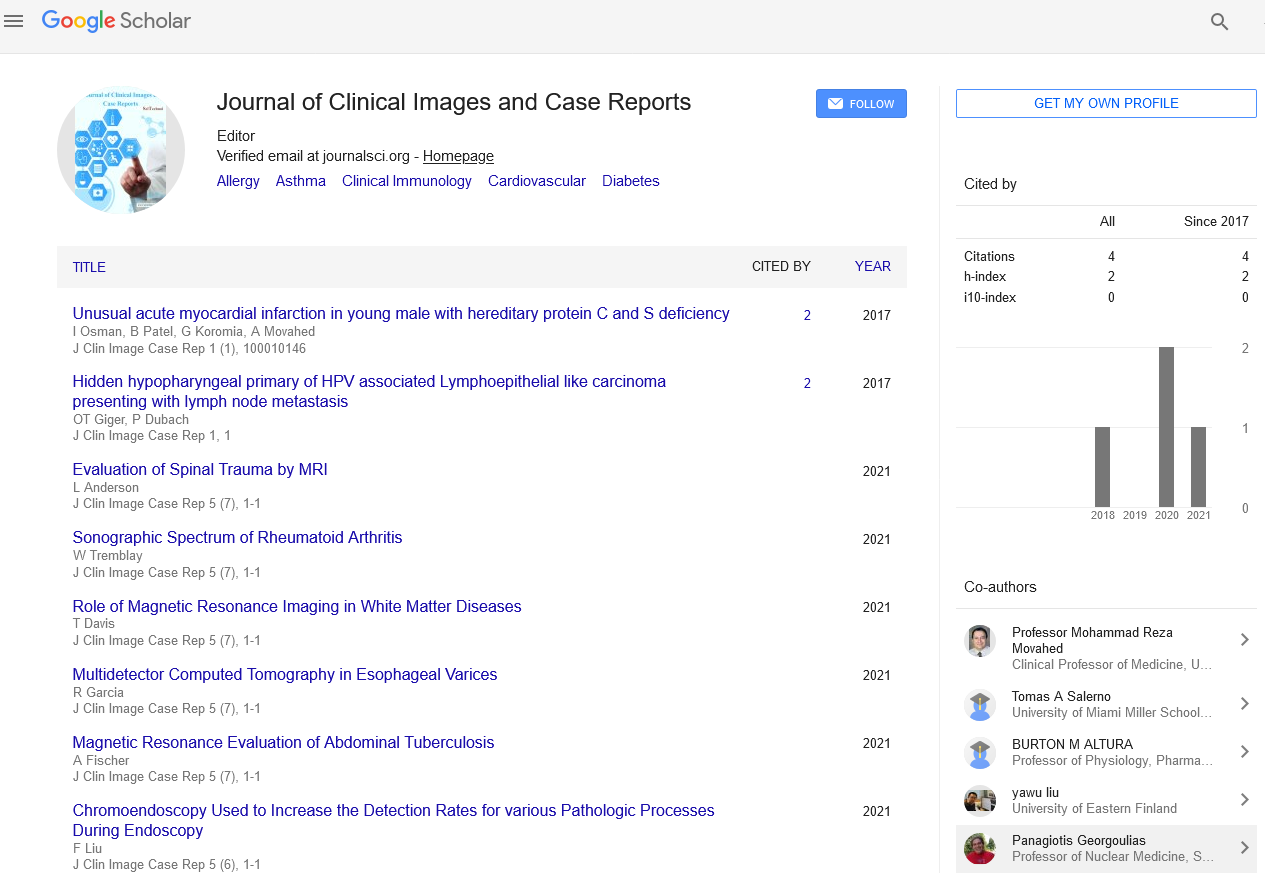Perspective, J Clin Image Case Rep Vol: 7 Issue: 2
Genetic Defects in Proteins Involved in Insulin Secretion: Implications for Diabetes Mellitus
Neiland Imam*
School of Nursing, University of North Carolina at Chapel Hill, North Carolina, United States of America
*Corresponding Author:Neiland Imam
School of Nursing, University of North Carolina at Chapel Hill
North Carolina, United States of America
E-mail:Imamm23@hotmail.com
Received date: 27 March, 2023, Manuscript No. CICR-23-98870;
Editor assigned date: 29 March, 2023, PreQC No. CICR-23-98870(PQ);
Reviewed date: 7 April, 2023, QCNo CICR-23-98870;
Revised date: 17 April, 2023, Manuscript No. CICR-23-98870(R);
Published date: 28 April, 2023, DOI: 10.4172/CICR.1000247.
Citation: Imam N (2023) Genetic Defects in Proteins Involved in Insulin Secretion: Implications for Diabetes Mellitus. J Clin Image Case Rep 7:2.
Description
Insulin secretion plays a pivotal role in maintaining glucose homeostasis, and disruptions in this process contribute to the development of diabetes mellitus. Genetic defects in proteins involved in insulin secretion have been identified as significant contributors to the pathogenesis of both type 1 and type 2 diabetes. This study aims to review the current knowledge on genetic defects in proteins implicated in insulin secretion and their impact on diabetes mellitus. We discuss key proteins involved in insulin synthesis, processing, and secretion, highlighting the genetic defects associated with each protein. Furthermore, we explore the mechanisms by which these genetic defects impair insulin secretion, providing insights into the pathophysiology of diabetes. Understanding these genetic defects is important for developing novel therapeutic approaches targeting the underlying causes of diabetes and personalized treatment strategies.
Diabetes mellitus is a chronic metabolic disorder characterized by hyperglycemia resulting from defects in insulin secretion, insulin action, or both. While environmental factors and lifestyle choices contribute to diabetes, genetic factors play a significant role in disease susceptibility. This study focuses on genetic defects in proteins involved in insulin secretion, shedding light on their impact on diabetes mellitus.
Diabetes mellitus is defined by the occurrence of hyperglycemia in the basal and/or postprandial states. Hyperglycemia results when the pancreatic β cell is unable to secrete enough insulin to maintain normal glucose levels given the metabolic context of the organism. Therefore, diabetes can be caused by a variety of mechanisms, but the final common pathway results from relative insulin insufficiency. Clinical complications shared by all forms of diabetes are thought to result from long-standing hyperglycemia but are compounded to a greater or lesser extent by comorbid conditions.
Proteins involved in insulin secretion
Proinsulin: Proinsulin, the precursor of insulin, undergoes posttranslational processing to form mature insulin. Genetic defects in proinsulin result in impaired insulin synthesis and secretion, leading to neonatal diabetes and Maturity-Onset Diabetes of the Young (MODY).
Glucokinase: Glucokinase is a key regulator of glucose sensing in pancreatic beta cells. Mutations in the glucokinase gene impair glucose-induced insulin secretion, resulting in MODY subtype 2.
ATP-sensitive potassium (KATP) channels
KATP channels regulate insulin secretion by sensing changes in intracellular ATP levels. Mutations in genes encoding KATP channel subunits lead to neonatal diabetes, including Kir6.2 (KCNJ11) and SUR1 (ABCC8) mutations.
Calcium channels: Calcium influx triggers insulin exocytosis. Mutations in the calcium channel genes, such as CACNA1D, CACNA1F, and CACNA1S, impair calcium signaling and insulin secretion, resulting in neonatal diabetes and permanent neonatal diabetes mellitus.
SNARE proteins: SNARE (SNAp REceptor) proteins mediate the fusion of insulin containing vesicles with the plasma membrane. Mutations in the genes encoding SNARE proteins, such STX1A, SNAP25, and VAMP2, disrupt insulin secretion and are associated with diabetes.
Mechanisms of impaired insulin secretion
Genetic defects in proteins involved in insulin secretion disrupt various steps in the insulin synthesis, processing, and secretion pathway. These defects can lead to impaired proinsulin processing, reduced glucose sensing, altered KATP channel activity, impaired calcium signaling, and defective vesicle fusion. Consequently, inadequate insulin secretion and impaired glucose homeostasis occur, contributing to the development of diabetes.
Therapeutic implications
Understanding the genetic defects associated with insulin secretion proteins provides opportunities for developing targeted therapies. Approaches such as gene replacement, gene editing, and pharmacological modulation hold promise for restoring normal insulin secretion and glucose control. Additionally, knowledge of these genetic defects enables the development of personalized treatment strategies for individuals with diabetes, based on their specific genetic profile.
Conclusion
Genetic defects in proteins involved in insulin secretion are significant contributors to the pathogenesis of diabetes mellitus. Studying these defects enhances its understanding of the molecular mechanisms underlying impaired.
 Spanish
Spanish  Chinese
Chinese  Russian
Russian  German
German  French
French  Japanese
Japanese  Portuguese
Portuguese  Hindi
Hindi 